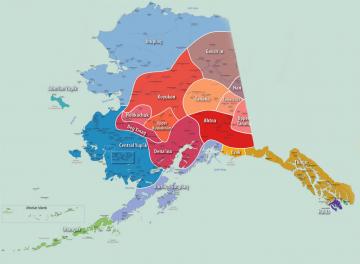On Thursday, Representative Charisse Millett (R-Anchorage), Representative Jonathan Kreiss-Tomkins (D-Sitka), Representative Benjamin Nageak (D-Barrow), and Representative Bryce Edgmon (D-Dillingham) announced they are pre-filing the Alaska Native Language Bill to make each of the Native languages in Alaska an official language of the state.
 In current state law, English is Alaska’s only official language. This bill would expand the list to include Iñupiaq, Siberian Yupik, Central Alaskan Yup’ik, Alutiiq, Unangax̂, Dena’ina, Deg Xinag, Holikachuk, Koyukon, Upper Kuskokwim, Gwich’in, Tanana, Upper Tanana, Tanacross, Hän, Ahtna, Eyak, Tlingit, Haida, and Tsimshian.
In current state law, English is Alaska’s only official language. This bill would expand the list to include Iñupiaq, Siberian Yupik, Central Alaskan Yup’ik, Alutiiq, Unangax̂, Dena’ina, Deg Xinag, Holikachuk, Koyukon, Upper Kuskokwim, Gwich’in, Tanana, Upper Tanana, Tanacross, Hän, Ahtna, Eyak, Tlingit, Haida, and Tsimshian.
“Losing a language is losing a way of understanding the world,” said Kreiss-Tomkins. “We hope this legislation will add even more momentum to the revitalization of Alaska Native languages.”
“Native culture enriches the lives of Alaskans in so many ways,” said Millett. “Naming Alaska’s twenty indigenous languages as official languages of the state of Alaska demonstrates our respect and admiration for their past, current, and future contributions to our state.”
“This legislation will highlight the importance of preserving and revitalizing the rich and diverse cultural legacy inherent in Alaska Native languages,” said Edgmon, chairman of the House Bush Caucus. “We recently celebrated our 50th year of statehood. In another 50 years I would like to see the many languages of our first Alaskans playing a vibrant role in the lives of people all over the state.”
“I want to thank Representative Kreiss-Tomkins for starting the process of the passage of this bill. We, the co-sponsors, feel this bill will be a positive and long overdue formal legislative recognition of all the Native languages still spoken in this great state of ours and the people who still speak their own language,” said Nageak.
Nageak continued, “Those of us who still speak and write our language want to make sure that all Native languages in the state of Alaska do not die off and want them passed on to the younger generation and the generations that will come in the near and distant future. The first words I ever spoke in my life were Iñupiaq words. My generation spoke only Iñupiaq when we were growing up and did not learn to speak English until the age of 6 years old when we started school as kindergartners. Our generation has struggled with and has been somewhat complicit in not speaking our languages when we became parents, therefore the majority of the generation we parented does not speak or write the different Native languages that were spoken entirely by Native people from generations past. We, as prime co-sponsors, feel that this bill is a start in making sure that future generations of Native speakers multiply until someday all of our Native people will once again be totally fluent in their own Native tongue with the added capability of speaking the English language.”
Making these languages official languages of the state of Alaska is a symbolic gesture to acknowledge their importance to Alaskans and the state’s heritage. Passage of the bill will not require public signs and documents to be printed in multiple languages, and it will create no additional costs to the state.
The bill will be assigned a bill number and released on Friday, January 10. It will be read into the official record and assigned committees of referral on the first day of the upcoming legislative session, January 21, 2014.
